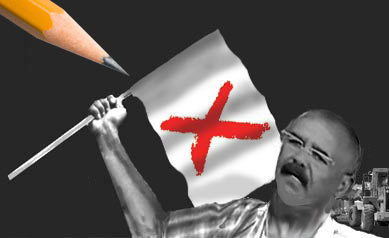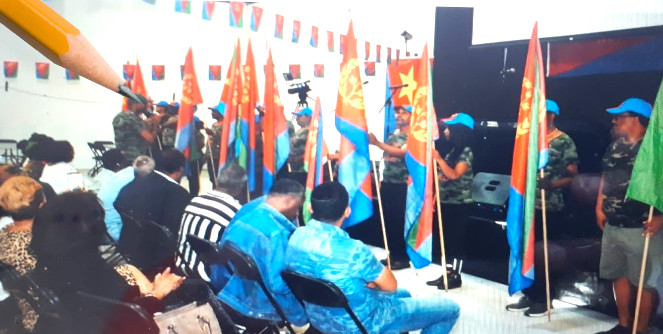Power To The Spirit Of Adi Keih

Food. Clothing. Shelter. These are basic economic needs of human beings. Land. Labor. Capital. These are basic factors of production. The Eritrean regime is a bourgeois society! Even if Marxist lingo is outdated, it describes the regime accurately. And Land has always remained at the center of Eritrea’s problems. Everything is about LAND.
For some time now, the Eritrean regime has been demolishing houses in the outlying areas of Asmara where it razed many houses to the ground. Over the last few weeks, anxiety- struck Eritreans heard news spread about the demolition of houses. Continuing its cycle of brigandage, one fine morning two weeks ago the regime’s bulldozers rolled to several villages around Asmara to destroy homes. It must have felt good because the bulldozers rolled over 110 kilometers of asphalt road and reached Adi Keih. Once there, they leveled more houses to the ground. A visitor to Adi Keih exclaimed, “Just like Israel does to the Palestinian houses!” Returning home after three decades in exile, the visitor didn’t expect that kind of reception. He cut his visit short and immediately returned home, to the UK.
Unlike the other villagers who simply wept watching their houses turn into rubble, the youth of Adi Keih reacted differently, the government had pushed them a little too far. While the helpless homeowners watched through the dust in agony, the high school children snapped and faced the unsuspecting demolition teams. A confrontation ensued. Several students were killed or injured. The regime’s demolition expedition was interrupted. For weeks, Eritrean circles were buzzing with that news. Yesterday the demolition crew resumed their brigandage in Adi Keih and are expected to continue to other towns where condemned houses are already marked with a red X.
Adi Keih has a college that houses several thousand students. Attempts by the high school youth to convince the college students to join them in facing the government’s gangs failed. That was because the college “kids” are not locals, they have no attachment to the demolished houses. The local high school students have. They went it alone. They paid for their defiance with their blood.
There is a painful history in every inch of the much abused Eritrean land.
Before the launching of the Eritrean armed struggle in 1961, Ethiopian officials distributed fertile plots of land on the banks of the Barka river to their cronies who had no clue where Barka river was. The plots were distributed under the guise of land development schemes. Subsidized diesel oil for water pumps was allocated to the cronies who fenced the grabbed plots with walls of acacia shrubs. Every month they signed a piece of paper and received barrels of diesel which they sold to retailers in Akordat and other towns. The plots remained fallow though a source of cheap diesel oil.
Meanwhile, cattle herders were denied access to their wells and they were not willing to reach the river through a long loop to avoid the fences. Those was their ancestral lands and no crony should have the right to deny their cattle suitable passage to the water and the wells that were always theirs since creation. They defiantly removed the fences. And that created altercations between the delegates of the absentee new landlords and the native cattle herders. The government interfered to support and protect the “rights” of the cronies against the “illegal action” of the herders. The first clash between the local people and the Ethiopian forces was ignited. It became the precursor to the Eritrean armed struggle that was launched in that area.
After the liberation of the Eritrean territories, the Eritrean regime kept the land policies of the previous occupiers intact. It completely ignored pastoral rights and focused on advancing agrarian mode of production, albeit making itself the mega agriculturist.
The governments “Land Proclamation 58/1994” makes it clear. Its land policy addresses agrarian land uses, “Tzlmi, Desa, Public Domain, Quah Mahtze, Meret Worki”, none of which addresses pastoral lands. And in Section2, Article 3, item #1, (article 2.1), the proclamation states, “In Eritrea, land is owned by the State.” Worse, Article 4 states that, “Every Eritrean citizen shall have a usufruct right over land.” But the part that is the cause of the current demolition of houses is Article 2 (2) concerning “…those Eritrean citizens who are granted Government permission to settle in villages and live by using the land,” and Article 2 (3), “Without prejudice to sub-article 2 of this Article and Article 29(4) of this Proclamation, every Eritrean citizen shall have the right to obtain tiesa land (land for housing) in his home village.”
Based on the above, veteran combatants were deservedly given residential plots (Tiesa land) of about 500 square meters. However, cronies of the regime, and those who could afford to pay enough bribes, also received plots. Individuals opposed to the regime have no chance of getting any plot of land. At any rate, most of those who were given plots of land did not have money to build a house, and those who had the money did not have land. A new derivative market emerged in the Eritrean real estate business: brokers matched customers who have the land with those who have the money. The land was then divided into two equal parts and those who have the money paid for the construction of two house: one for the landowner and the other for the financier. The ruling party knows about this and has been benefiting from it.
Sadly, even those who wanted to build houses on their inherited lands were denied construction permits which are issued for a few months and then frozen, then issued again, only to be frozen one more time. Completely haphazard. The excuses for freezing construction are so many: unavailability of cement, scarcity of iron bars, bricks, roofing, lumber, etc. Again, the permit issue was an opportunity to create another derivative market: brokers, some of whom call themselves lawyers, offered their services to get construction permits for those who wanted to build houses. But their service doesn’t involve a legally known process of getting permits. Instead, they identify how much bribe and to whom their clients should pay to be able to build their houses. Usually, the permit is not written; it’s a verbal permit. The bribed authority turns a blind eye. House builders work from sunset to sunrise, under the cover of darkness, avoiding work in daylight to avoid the risk of implicating the bribed authorities.
This has been going on for nearly 20 years. During that time, thousands of houses were built, with hundreds of millions of dollars worth of investment. Usually the invested money is a lifelong savings, mainly of maids, taxi-drivers, and other workers toiling in Europe, North America, or the Middle East. But no government official faces housing problems: they have secured residences as squatters in the houses that the Ethiopian Derg confiscated and which the regime kept. The regime also sorted out the housing problems of its cronies: it provides its supporters with land, and financing through the Housing Bank. That is easy because the regime owns all the land and all the banks.
According to estimates by knowledgeable business people, about half the new houses built in the last 20 years or so are “illegal”. If the government wants to pursue its brigandage and demolish houses, most of the houses were built based on the derivative financial deals. Therefore, if the regime sticks to the criteria it used to demolish the houses of Adi Keih, and fairly follows it through, over half the houses built since the mid 1990s would be razed to the ground. It won’t do that.
It’s understood that governments invoke “eminent domain” to demolish houses when cutting a road, constructing a public buildings, or removing a structure that is hazardous to the safety of the people. But no one understands the madness of demolishing houses in villages that do not have such complications. Worse, given the shortage of houses, no one understand why a government would consciously hamper the construction of houses and demolish those that are standing and sheltering families–people got married and raised families in these houses that they call home!
For the past two decades, on every occasion, Isaias Afwerki appeared on television and promised a solution for the housing crisis. Every year, he lied through his teeth, with a straight face. Every time he made false promises, his errand boys in his embassies marketed would-be-built houses through glossy brochures and impressive architectural models. Investors went to Eritrea, gave up on the situation and returned home, some lost good money. Diaspora Eritreans were milked of their money in “advance-sale” schemes publicized by the regime. In its pursuit to monopolize the present and future markets, the ruling party suffocated small contractors; most of them went bust or left the country. Meanwhile, nothing ameliorated the acute shortage of housing. Let alone cater for the population increase, the regime failed to cater to the population that received it with hope in 1991.
The Eritrean regime would not allow entrepreneurs and business people to take care of the housing shortage and solve the mundane problems. It wouldn’t for fear of losing its monopolistic grip on the economy. The ruling party hates the dynamics of a free market economy, it is a tyranny and control freak–with severe consequences to the nation.
The #58/1994 land proclamation accomplished one thing: the government owns all the land and citizens are treated as squatter in their own country. In a 2001 interview with Saleh Younis, the late Seyoum Ogbamichael describes the proclamation as follows:
“The existing PFDJ policy is a policy of plunder … a veneer that says, land is the property of the government, is a ploy to own and to distribute land selectively and on whim; to enforce your power interest until you solidify your financial capability. To seize land as you wish; to offer land in the marketplace in exchange for hard currency, is to undermine the basic asset of our people that they used for ages. In short, it is undermining and pulling the carpet from under their legs… it is a policy of looting. It is unpopular, illegal and undemocratic.”
Finally, since the regime doesn’t want to construct houses, and wouldn’t allow others to build, and is demolishing standing, livable house, maybe the escaping youth would ease the pressure on housing! Maybe the regime plans to push every citizen out of the country so that it can lord over a country it turned into rubble.
Long live the spirit of Adi Keih
Related Reading:
The late Seyoum Ogbamichael on land and other issues
Eritrean Land Proclamation 58/1994
Herui T. Bairu’s Strategy Addi



Awate Forum